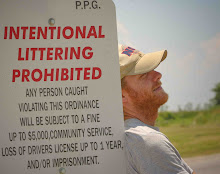 The Maple Street neighborhood is voting for a second time on whether to implement a district security tax. Here's some wider context:
The Maple Street neighborhood is voting for a second time on whether to implement a district security tax. Here's some wider context:Quite a big deal has been made in recent years about private security corporations - mercenaries. Thanks to Jeremy Scahill's reporting, Blackwater has received an enormous dose of publicity, so much so that they've had to re-brand themselves as Xe.
Blackwater, Triple Canopy, ISI and other for-profit companies that have privatized war-fighting functions are mostly a product of the Iraq and Afghan wars. Although many of them existed before 2001, the "war on terror" has booseted their fortunes and profiles immensely.
This is partly why in 2005, when Katrina struck, when N.O. was flooded and later evacuated, and when several Uptown elites ordered the services of some of these infamous companies (and FEMA even hired Blackwater for its own security) many journalists were quick to write this up as an ominous and new turn of events. Mercenaries brandishing assault rifles in an American city? Lots of people thought it was new. Scahill wrote about it at the time:
"As business leaders and government officials talk openly of changing the demographics of what was one of the most culturally vibrant of America's cities, mercenaries from companies like DynCorp, Intercon, American Security Group, Blackhawk, Wackenhut and an Israeli company called Instinctive Shooting International (ISI) are fanning out to guard private businesses and homes, as well as government projects and institutions. Within two weeks of the hurricane, the number of private security companies registered in Louisiana jumped from 185 to 235. Some, like Blackwater, are under federal contract. Others have been hired by the wealthy elite, like F. Patrick Quinn III, who brought in private security to guard his $3 million private estate and his luxury hotels, which are under consideration for a lucrative federal contract to house FEMA workers."True enough, the firepower these global mercenaries brought to New Orleans was new, but the advent of privatized policing and security isn't new at all in Louisiana. New Orleans has had dozens of private security companies for many years. The state has been at the cutting edge of private security for several decades.
As someone who walks through the Garden District a lot - I don't own a car - I've noticed that one of the main functions of these security companies is to stop and harass "suspicious characters." Suspicious in these contexts usually means young black folks walking or riding bikes through these lily white and very wealthy enclaves. In general, suspicious is anyone walking in these areas after dark, excepting the yuppies jogging their dogs and other obvious residents. If you don't look like a millionaire you're going to get eyed. If you're not driving a Lexus, you're suspect.
If you cruise around the "sliver by the river" you'll notice in short time that most every house in the well-to-do Uptown has a little lawn sign, usually placed conspicuously on near the front steps or driveway. These advertise the home owner's private security firm. The strangest company name I've yet seen is "Nuko" security. There's literally dozens of these companies in the metro area.
Privatized policing functions exist in N.O. through special district taxes that wealthier neighborhoods levy upon themselves. Raising upwards of several hundred thousand to several million dollars, many of these neighborhoods then hire firms like NOPP and Garden District Security to cruise their streets day and night. Supporters of this say it adds "security" and "reduces crime." Perhaps it does for them. What's interesting here is that the city's wealthy and middle class majority white communities have looked to private security corporations to seal their neighborhoods off from "criminals," instead of trying to build up the police budget and increase patrols. This is partly due to the distrust that all New Orleanians have for the police. It's also due to the fact that this city's wealthy simply do not want to share their tax dollars. Just as is with schooling, health care and housing, New Orleans' affluent, mostly white minority has for many decades horded their wealth into privatized vessels such as this.
Someday I'll write a short history of privatized policing in N.O.
In the meantime I remain a "suspicious pedestrian."

No comments:
Post a Comment